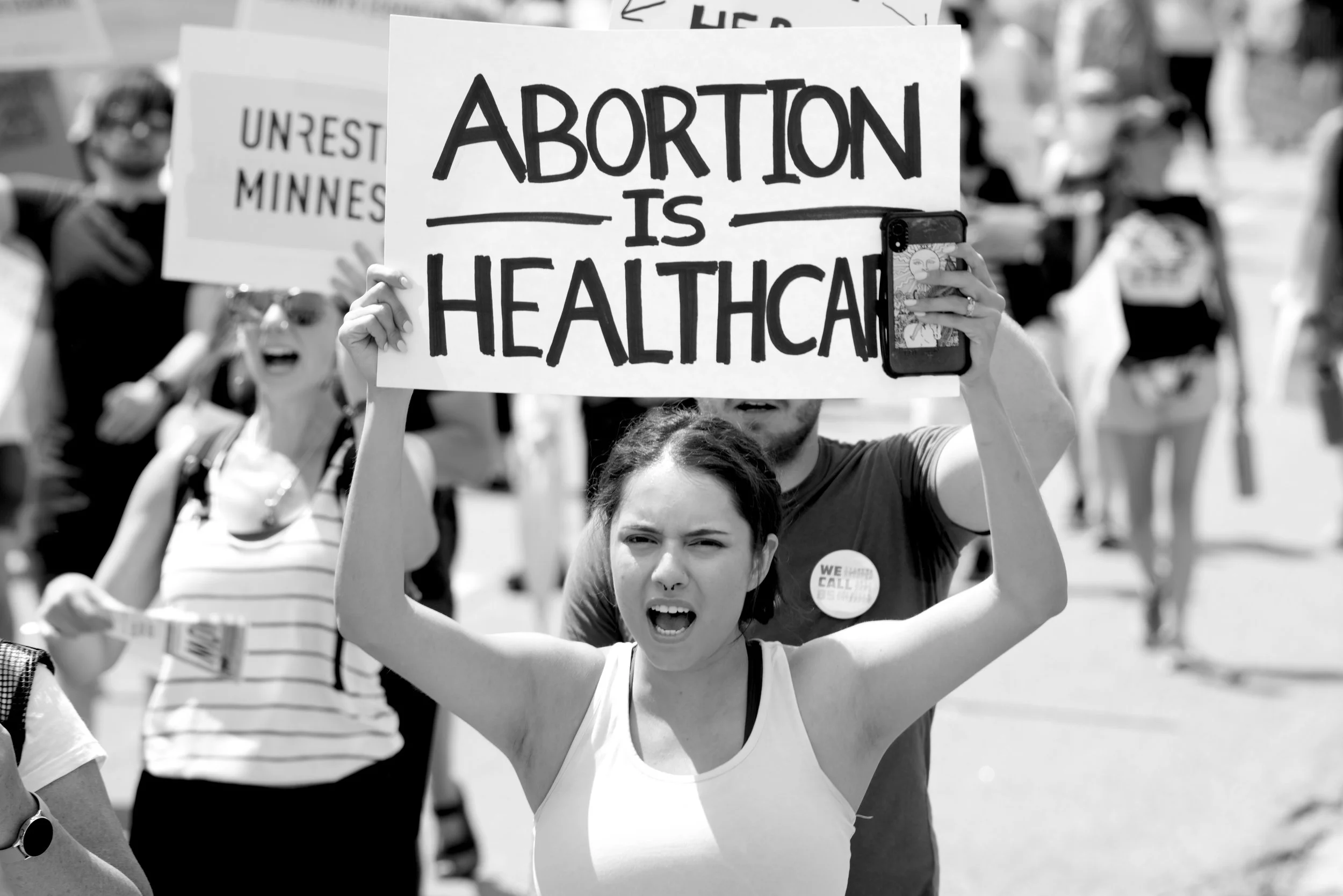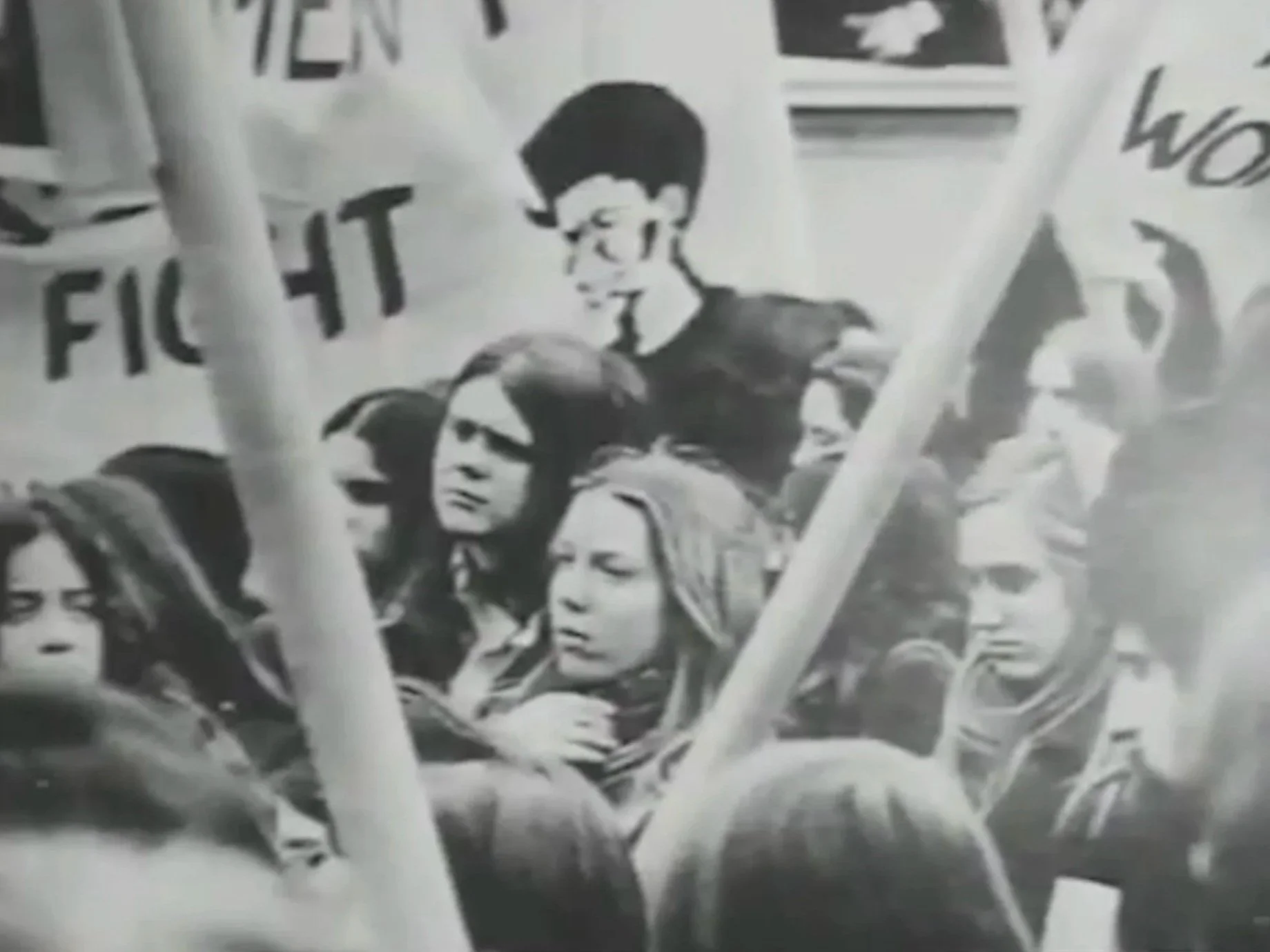Abortion
and Women’s Rights 1970
The first film ever made about the struggle for abortion rights in the U.S., originally released in 1970, this powerful archival piece documents women’s voices from a pre-Roe v. Wade era.
About
Abortion and Women’s Rights 1970
1971/2022, 28 minutes, 16mm
Filmmakers: Catha Maslow, Jane Pincus, Mary Summers, Karen Weinstein
The first film sharing women’s own stories of illegal abortions in the U.S.
Four young women made this film in 1970, as activists in the women’s liberation movement. We wanted to speak to women’s experiences at a time when mostly male state legislatures were debating whether to legalize abortion. Many women spoke with us about the fears, anxieties, stigma, health consequences, and financial stress they faced. The film tells two of their stories. Sue, a young, single woman desperately seeks a doctor willing to provide an abortion, while Marie, pregnant again after giving up her first baby for adoption, must take drastic measures at home to end her pregnancy.
In 1970, hundreds of thousands of women sought illegal abortions. The risks were high, and most of those who died were poor Black women; the maternal mortality rate of Black women in 1970 was four times that of white women. Birth control was also tested on poor women of color, who in some states also faced forced sterilization. In response to these conditions, the filmmakers demanded the right for all women to control their own bodies and decent health care for all.
Today women in many states are once again being denied access to abortion; and once again, those in the most need are feeling the greatest burden.
This film is a time capsule of the not so distant past, and serves as a reminder of the foundations of our fight for reproductive freedom today.
We won’t go back.
To schedule a screening, or for interview requests, impact screenings, or general inquiries, contact us at womensrights1970@gmail.com
See the Film
Awards
Past Screenings
March 2025
Dakotans for Health community screening
Sioux Falls, SD
March 2025
Women’s History Month
Orange Coast College, CA
January 2025
Free Library of Philadelphia screening
In partnership with Abortion Liberation Fund, PA
March 2024
Wellstone Democratic Renewal Club, Women’s History Month
Oakland, CA
January 2024
Penn for Reproductive Rights
University of Pennsylvania
January, 2024
Planned Parenthood
Mar Monte, CA
October, 2023
Constitutional Law Class
Christopher Newport College
October, 2020
Planned Parenthood of Northern New England
On-line fundraiser
The Filmmakers
Catha Maslow
Jane Pincus
Mary Summers
Karen Weinstein
The directors and actresses who made this film had very different abortion experiences. Karen was blindfolded in a locked room during her pre-Roe illegal abortion. Sue also experienced a frightening illegal abortion, whereas Mary and Jane later had access to legal abortions. But over the decades that followed, all were deeply aware that anti-abortion activism and legislation were chipping away at access to safe, affordable procedures, especially for low-income women. When Karen reconnected the filmmakers in 2019, they agreed to update their film and make it widely accessible. They hope this reminder of what women faced before Roe v. Wade — and all they fought for — will aid the ongoing struggle for reproductive justice and equitable health care.
In the decades between making this film and now, these filmmakers — Catha Maslow, Jane Pincus, Mary Summers, and Karen Weinstein —and actresses –Susan Jhirad and Janet Murray– pursued their commitment to social justice in different arenas.
Catha Maslow started to work on the film after dropping out of a Master's in psychology program. Although she had a life-long interest in understanding human nature, she found the anti-war, women’s and spiritual movements much more compelling at that time. In 1973, she moved from Boston to Warwick, NY to live in a community involved in spiritual development based on the ideas of Gurdjieff. There she met her husband David, an artist, and they had two sons, who both married and had children. She studied family therapy and hypnosis and received a Masters of Social Work. She worked as a beloved therapist until her death in 2015.
Jane Pincus is a co-author of the well-known women’s health book, 'Our Bodies, Ourselves.' This book has empowered women in the U.S. and abroad with information and knowledge with which to take their health care into their own hands. Subsequent editions of the book have become available in 36 languages. Throughout that time Jane has testified and advocated for maternity care reform (and revolution!), for reproductive choice and justice. Also working as an artist for decades, she has lived with her family on a hill in Central Vermont.
Mary Summers worked as a Physician’s Assistant in the 1980’s and 90’s, while continuing to be involved in political organizing. She also served as a speechwriter for Jesse Jackson’s 1984 presidential campaign and Harriett Woods’ 1986 Senate campaign in Missouri. After earning a graduate degree in political science, she taught service-learning courses on the politics of food and agriculture, and healthy schools at the University of Pennsylvania. She serves on the board of Philadelphia Jobs with Justice. She has published articles on American urban and agricultural history and politics and service-learning.
Karen Weinstein has fought for women's rights throughout her career. She trained with Emerge CA to run for office and subsequently held elected office in the field of education. She was Chair of the California Democratic Party Women’s Caucus, as well as Advisor to Close the Gap CA, a statewide campaign to achieve gender equality in the CA Legislature. She is Policy Chair of the American Association of University Women, Berkeley. She directed three videos encouraging others to run for office. Assembly Member Nancy Skinner named her Woman of the Year and multiple organizations, including California Young Democrats and Democratic Women have given her awards for her leadership, public service, and for being an inspiration to young women.
The Actresses
Susan Jhirad
Janet Murray
Susan Jhirad’s own experience with illegal abortion is much like that she tells in the film. She has been a lifelong activist in civil rights, anti-war, women’s rights and labor organizing movements. The women’s movement changed her life. She taught English for 30 years at North Shore Community College. She has been married to Michael Glenn for more than 40 years. David Jhirad, her first husband and father of her son Rajan (Dylan) who played the “bad boyfriend” in the movie, remained a good friend, until his sudden death from cancer.
Janet Murray was a young parent, living in Cambridge in the 1970’s when she, her apartment, and her babies were enlisted for the film to represent a working class woman who was willing to tell her story, but not be photographed. After working as a high school Spanish teacher, she became a social worker in Boston’s South End. She later served as the produce manager at the Cambridge Food Coop and Executive Director of Food for Free. A longtime activist, she was elected to Cambridge’s Ward 5 Committee and served on the boards of the Cambridge Economic Opportunity Committee and the Cambridge Camping Association, as well as organizing for many progressive causes and candidates. Beloved by her family, friends, and neighbors, she died at the age of 90 in 2024.
In The Press
"The film was ahead of its time in that it called for intersectional demands, including an acknowledgment of the troubling treatment of Black and Puerto Rican women, including forced sterilization.” - Repro Rights NOW
"...serves as a powerful reminder of the conditions and demands that inspired the movement for abortion rights 50 years ago. . . At a time when the world wasn’t very intersectional, the[se] stories are." - Punk Rock HR Podcast
"Women’s outrage and the creative bravery of determined activists drive this raw documentary of 1970, when women’s demands to make abortion legal and accessible were starkly radical. Illuminating that moment in a unique nitty-gritty perspective, the film offers sobering lessons for the present." - Nancy F. Cott, Author Of The Grounding Of Modern Feminism
“Abortion Rights Advocacy: Past and Present”, Harvard Magazine
“Abortion and Women’s Rights 1970: A film that’s newly timely”, Penn Today
“Well, if we have to break the law, how are we going to do it?”, Burnt Toast Podcast
“Abortion and Women’s Rights 1970 screened to OCC students in post Roe v. Wade America”, Coast Report
“Support abortion rights, free speech & health care for all”, The Daily Californian, by Karen Weinstein, Jane Pincus, & Mary Summers
“Abortion - Then, now, and tomorrow”, The Philadelphia Citizen
“Vermont College of Fine Arts interview with filmmaker Jane Pincus”
“The Community of Hope”, Violet Book
Interview with Mary Summers about the film at Free Library of Philadelphia
Abortion Rights Resources
Many organizations across the country and throughout the world have taken the lead in the movement for reproductive justice. The link below offers ways to support and participate in that work.
Contact
To schedule a screening, or for interview requests, impact screenings, or general inquiries, contact us at womensrights1970@gmail.com














